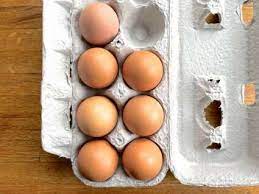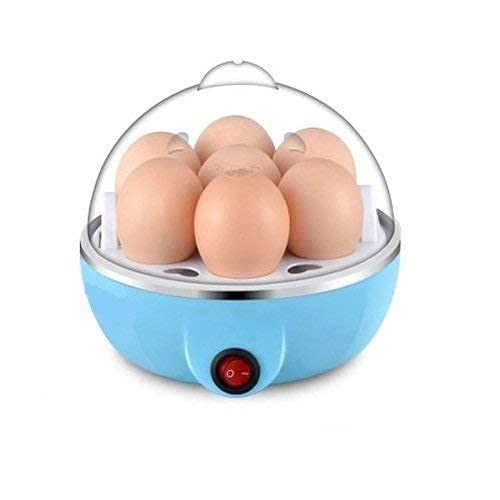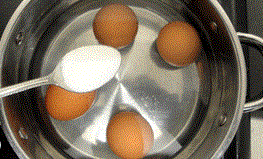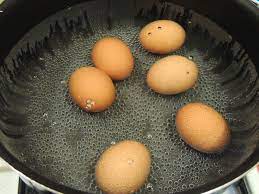Are you also frustrated by cracked boiled eggs, then here are tips to boil eggs without cracking. Boiling eggs may seem like a walk in the park, but let’s be honest – dealing with cracked shells can really burst our bubble. But don’t fret, my friend! I’ve got your back with five fantastic tips that will ensure your boiled eggs come out flawless every single time. So, whether you’re whipping up a hearty breakfast, tossing together a tasty salad, or creating some mouthwatering deviled eggs, follow these simple yet effective tricks to bid farewell to those pesky cracks. Stay tuned to witness the amazing tricks on how to boil eggs without cracking.
Factors Contributing to Egg Cracking
Sudden Temperature Change
One of the main culprits behind egg cracking is a sudden change in temperature. When eggs are exposed to rapid temperature variations, the shell expands or contracts quickly, causing cracks. Therefore, it’s crucial to handle eggs with care and ensure a gradual transition from one temperature extreme to another.
The freshness of the Egg
The freshness of the egg also plays a role in its vulnerability to cracking. Fresh eggs have a higher water content and a tighter membrane, making them more prone to cracking. Older eggs, on the other hand, have a slightly drier shell and are less likely to crack during boiling.
Cooking Method
The cooking method employed can significantly impact the likelihood of egg cracking. Different methods, such as boiling, steaming, or microwaving, have varying degrees of success in preventing cracks. We will explore some of these methods in detail later in the article.
Tips to boil Eggs without cracking
Tip 1: Room Temperature Eggs

Start by using eggs at room temperature. Cold eggs are more likely to crack when subjected to heat, as the sudden temperature difference stresses the shell. Allowing the eggs to come to room temperature before boiling promotes a more gradual temperature change and reduces the chances of cracking.
Tip 2: Use an Egg Steam Boiler

An alternative to boiling eggs is steaming them. Steaming can be a gentler method of cooking that reduces the chances of cracking. Simply place the eggs in a steamer basket or a colander set above simmering water and cover the pot. Steam the eggs for the desired amount of time, following a similar cooking time as boiling, and enjoy perfectly cooked eggs with a lower risk of cracking.
Tip 3: Add Salt or Vinegar to the Water

Adding a teaspoon of salt or vinegar to the boiling water can help reduce the likelihood of egg cracking. These ingredients help reinforce the eggshell and make it less susceptible to damage during cooking. The salt or vinegar acts as a protective barrier and adds a bit of resilience to the eggs, ensuring a better chance of avoiding cracks.
Tip 4: Slow Heating

Another on tips to boil eggs without cracking is to start the cooking process with gentle heat. Place the pot with the eggs on the stove over low to medium heat, allowing the water to gradually come to a boil. Avoid rapid boiling, as it can cause the eggs to bounce around and potentially crack against each other or the sides of the pot.
Tip 5: Using a Pin

To further prevent egg cracking, you can use a pin or a specialized egg pricker to create a tiny hole in the wider end of the egg before boiling. This puncture allows any air inside the egg to escape, reducing the pressure buildup that can lead to cracking. Gently prick the shell without piercing the membrane, and then proceed with the boiling process as usual.
How to prevent boiled eggs from sticking to the shell?
To prevent boiled eggs from sticking to the shell and make them easier to peel, you can try the following tips:
- Add salt or vinegar to the boiling water: As mentioned earlier, adding a teaspoon of salt or vinegar to the water can help create a slight chemical reaction that loosens the bond between the egg whites and the shell.
- Use older eggs: Eggs that are a bit older (around 7 to 10 days) tend to have a slightly higher pH, which can make them easier to peel. Fresher eggs may stick more to the shell.
- Shock the eggs in ice water: After boiling, immediately transfer the eggs to a bowl of ice water. This rapid cooling helps shrink the egg contents slightly and can make peeling easier.
- Gently tap and roll the eggs: Once the eggs are cooled, tap them gently on a hard surface to crack the shell, then roll them gently between your hands to loosen the shell. This can help facilitate easier peeling.
How long to boil eggs?
The cooking time for boiled eggs depends on the desired level of doneness. Here are some general guidelines:
- Soft-boiled eggs: Boil for 4 to 6 minutes for a runny yolk.
- Medium-boiled eggs: Boil for 7 to 9 minutes for a slightly set yolk.
- Hard-boiled eggs: Boil for 10 to 12 minutes for a fully set yolk.
Related FAQ
Can I prevent egg cracking by adding oil to the water?
No, adding oil to the water does not prevent egg cracking. It may create a thin film on the water’s surface, but it doesn’t provide any significant protection to the eggs.
Why do some eggs crack even when following the precautions?
While following the precautions significantly reduces the chances of egg cracking, it’s important to note that individual eggs can vary in their shell strength and integrity. Some eggs may have imperfections or thinner shells, making them more prone to cracking despite taking precautions.
Can I use a microwave to boil eggs?
It is not recommended to boil eggs in a microwave. The rapid heat generated by microwaves can cause the eggs to heat unevenly, potentially leading to unexpected explosions. Stick to traditional boiling or steaming methods for best results.
Conclusion
With these simple yet effective tips to boil eggs without cracking, you can now confidently boil eggs without the fear of cracking. Remember to use room temperature eggs, handle them gently, and avoid sudden temperature changes. Additionally, consider using salt or vinegar in the boiling water, employing a pin to release any air, or trying the steaming method for an alternative approach. By implementing these precautionary measures, you’ll enjoy perfectly boiled eggs every time, ready to be enjoyed in various dishes or savored on their own.
Do share your experience of boiling egg in the comment below.

nice